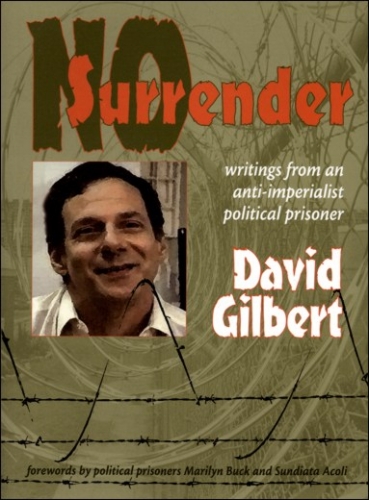No Surrender and the Losses of 10/20/81 by David Gilbert
The warm reception for my book is most welcome. I hope the title hasn’t caused any misunderstanding. No Surrender comes from the Nazim Hikmet poem about prison, which opens the book, on never giving up one’s principles, spirit, and zest for life. I did not at all mean to refer to a military concept or in any way to glorify the shoot-out that led to my incarceration.
I feel terrible about the deaths, the wounds, the fractured lives and families that resulted from that action. I’ve said this (and talked more specifically about the errors I made) in the few interviews I’ve done over the years, but perhaps my regrets and apologies haven’t been heard clearly because of all I’ve also had to say about the colossal violence of the social system and the brutal attacks on the Black Liberation Movement. However, my relationship to the deaths on 10/21/81 is very direct, so I need to address those losses very directly. Such a statement is especially needed because during trial, feeling very embattled and defending armed struggle as an abstract principle. I failed to publicly express regrets about the individuals who had been killed and wounded.
I feel terrible about the loss of life and the pain and suffering for the families of the two officers and guard who were killed. [I am not mentioning them by name out of respect for the wishes of the families.] Whatever the historical context for us, these three men just happened to be on duty that day. So it must have been an especially bitter loss for their families.
In another sad repercussion three days later, longtime Black liberation activist Mtayari Sundiata was killed by police. All the losses are more anguishing because they resulted from the grievous mistakes we made.
My own family was badly hurt; they never got to make choices about the risks I would take but they suffered the consequences. Yet as hard as it’s been for us, we’ve still been able to maintain a strong, tangible connection. The families of those who died were left with far more devastating losses: children growing up without fathers, mothers carrying on without husbands, families without a chance to share joys or ever again to hug their loved ones.
In any struggle, no matter how intense, we must never lose our feeling for each and every human being. The only reason to become an activist is love, love for the preciousness of life and for the rainbow colors of human potential. Those same values mandate that we take the greatest care and responsibility in how we fight for social change.
I proudly stand by my broad history of struggle and by solidarity with the Black liberation movement; my actions on 10/21/81 were wrong, and I deeply apologize for their role in the tragic loss of lives.

Leave a Reply